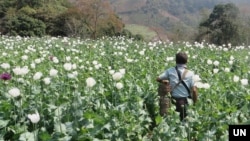A United Nations report finds that Myanmar has overtaken Afghanistan as the world’s top opium producer.
The change came after Myanmar expanded its opium production for a third year, the U.N. reported. In Afghanistan, production fell sharply in 2023 after the Taliban placed a ban on poppy farming.
The latest data on worldwide opium production was recently released in the U.N.’s report, the Southeast Asia Opium Survey 2023. The report was released by the U.N.’s Office of Drugs and Crime (UNODC).
The report estimates opium crops in Afghanistan dropped an estimated 95 percent in 2023 after the Taliban’s ban and enforcement efforts.
During the same period, an increasing number of farmers in Myanmar turned to opium as a new crop. The increase in production follows a military takeover of the government in 2021 that pushed the country into a civil war. The situation has severely hurt Myanmar’s economy.
The U.N. report estimates poppy growth and processing in Myanmar grew 33 percent in 2022 and another 18 percent this year. That amounts to a total of 47,000 hectares. That is the most land Myanmar has used for opium production since 2013.
Jeremy Douglas is the area representative for the UNODC. He told VOA the country’s economic and security situation have severely limited business possibilities and led more people to turn to opium farming to make money.
Most families in Myanmar make their living off the land. But a World Bank report released in May found that nearly half of farming families said they worry about having enough food. That number was up from 26 percent from a year earlier.
The UNODC estimates Myanmar’s farmers grew enough poppy this year to produce up to 1,080 metric tons of dry opium. This amounted to total earnings of up to $2.5 billion. Most of this money is believed to have gone to traffickers shipping the product across Asia and as far as Australia, often as heroin.
Most of that heroin flows through neighboring Thailand on its way to other places. In September, Thai police seized over 440 packs of heroin, along with some 15 million methamphetamine pills. A top Thai law enforcement official told VOA the $8.2 million drug seizure was the largest in the country’s history.
The UNODC report notes Afghanistan’s reduced opium production is expected to create a worldwide heroin shortage and drive prices higher. This is likely to lead even more farmers in Myanmar to start growing poppies.
Douglas said such a shortage could also result in more heroin processed in the Golden Triangle area making its way beyond the Asia-Pacific to Europe and North America. The Golden Triangle is a heavily criminalized area near the borders of Myanmar, Laos and Thailand. It is known for growing and producing large amounts of drugs.
Afghan heroin started taking over the European and North American markets from the Golden Triangle more than 10 years ago. That change came as drug controllers in Southeast Asia started dealing mostly in methamphetamine.
Douglas told VOA that even as Afghan production falls sharply, there is still large demand for opium on the world market. He said, “It’s highly likely that we’re going to start seeing Golden Triangle heroin returning to markets that it hasn’t been in for quite some years.”
I’m Bryan Lynn.
Voice of America's Zsombor Peter and the United Nations reported on this story. Bryan Lynn adapted the reports for VOA Learning English.
____________________________________________
Words in This Story
overtake – v. to catch up with and then pass by someone or something






Forum